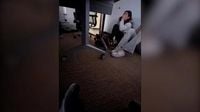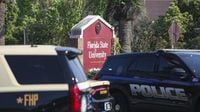On April 17, 2025, Florida State University (FSU) was rocked by a tragic mass shooting that left two people dead and six others injured. The incident unfolded around 11:50 a.m. when 20-year-old student Phoenix Ikner opened fire on campus, prompting a swift response from law enforcement and triggering a lockdown that sent students scrambling for safety.
Sophia Ziemer, a PhD student and teacher at FSU, was on campus during the shooting. Although she wasn’t supposed to be there, a "chain-reaction of events" led her to capture her experience during the lockdown on video. "Our first reaction was just to, like, run," Ziemer recounted in an interview with USA TODAY.
As the chaos unfolded, FSU sent out a text alerting the community of the active shooter situation. The message instructed students and faculty to seek shelter and stay away from doors and windows. Ziemer, who was tutoring with fellow graduate students in the William Johnston Building, quickly moved to the third floor after hearing gunshots.
In a conference room, Ziemer recorded the tense moments as students and faculty huddled together, some visibly shaken. "I’m scared," one student said in the video, while others comforted each other amid the blaring alarms. Ziemer called her wife, and many students reached out to their families, trying to reassure them of their safety.
Meanwhile, police responded to the scene almost immediately. Tallahassee Police Chief Lawrence Revell confirmed that officers engaged Ikner, who was subsequently shot and hospitalized with non-life-threatening injuries. The weapon used in the shooting was identified as a handgun that had previously belonged to Ikner's mother, a longtime deputy with the Leon County Sheriff's Office.
Tragically, the two men killed in the shooting were not students. Among the injured, five were shot, and another was hurt while trying to escape. According to Tallahassee Memorial HealthCare, two of the injured were expected to be discharged on April 18, three were in good condition, and one remained in fair condition.
In the aftermath of the shooting, a vigil was scheduled for 5 p.m. on April 18 at the university, and all classes were canceled for the day. Ziemer expressed her concern for her students, many of whom were left wondering how to retrieve their belongings or complete their final assignments after the terrifying ordeal.
As the community began to process the events, the police response to the shooting was noted for its effectiveness. Officers were equipped with rifles and body armor, responding decisively to the sound of gunfire, which likely prevented further casualties. This swift action was contrasted with the tragic events at Virginia Tech in 2007, where a similar incident resulted in 33 deaths.
According to law enforcement, the officers bypassed the wounded to reach the shooter, demonstrating a commitment to neutralizing the threat as quickly as possible. They issued commands to Ikner, who did not comply, leading to a necessary engagement that stopped the shooting.
Multiple agencies coordinated their efforts to ensure the safety of students and staff, securing the crime scene and providing medical assistance. This level of preparedness is believed to have played a crucial role in minimizing the loss of life.
In a statement addressing the public, FSU Chief of Police Jason Trumbower and Leon County Sheriff Walt McNeil clarified the facts surrounding the shooting, correcting initial misinformation that reported six deaths and two shooters. They revealed that Ikner had once participated in the sheriff’s youth program and was the stepson of a respected deputy, adding a layer of complexity to the tragedy.
As the investigation continues, the community is left grappling with the aftermath of the shooting. Ziemer reflected on the emotional toll of the experience, noting the challenges of supporting her students during such a difficult time. "I try not to be too, too motherly with them," she said, acknowledging the difficulty of balancing her role as an educator with the emotional needs of her students.
The shooting at FSU is a stark reminder of the ongoing issue of gun violence in the United States, with many calling for more effective measures to prevent such tragedies. As the nation mourns the loss of life and supports those affected, the need for dialogue and action surrounding gun control remains urgent.
In the coming days, as students return to campus, the focus will shift to healing and support. The university community is determined to come together, honoring the lives lost while advocating for change to ensure that such an event does not happen again.





